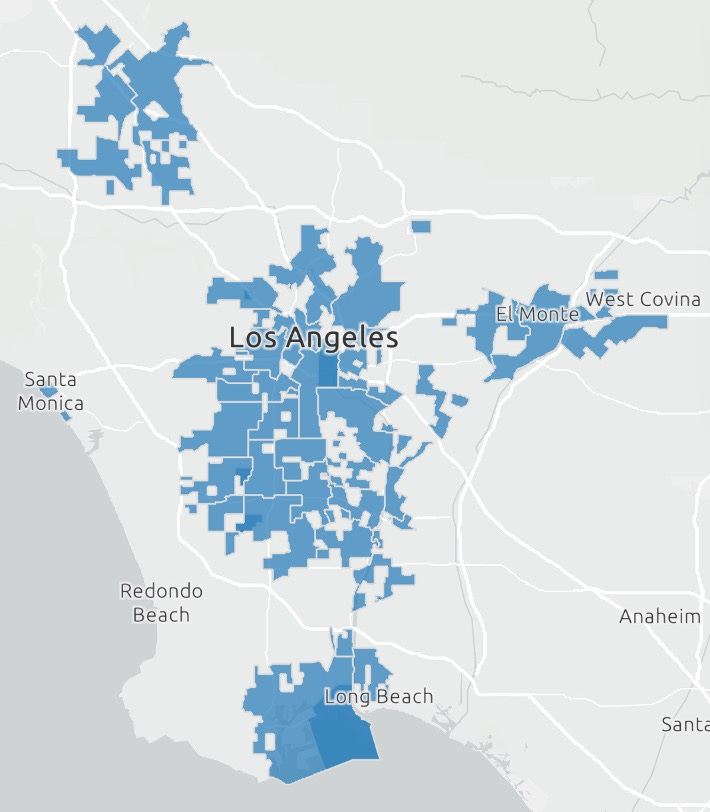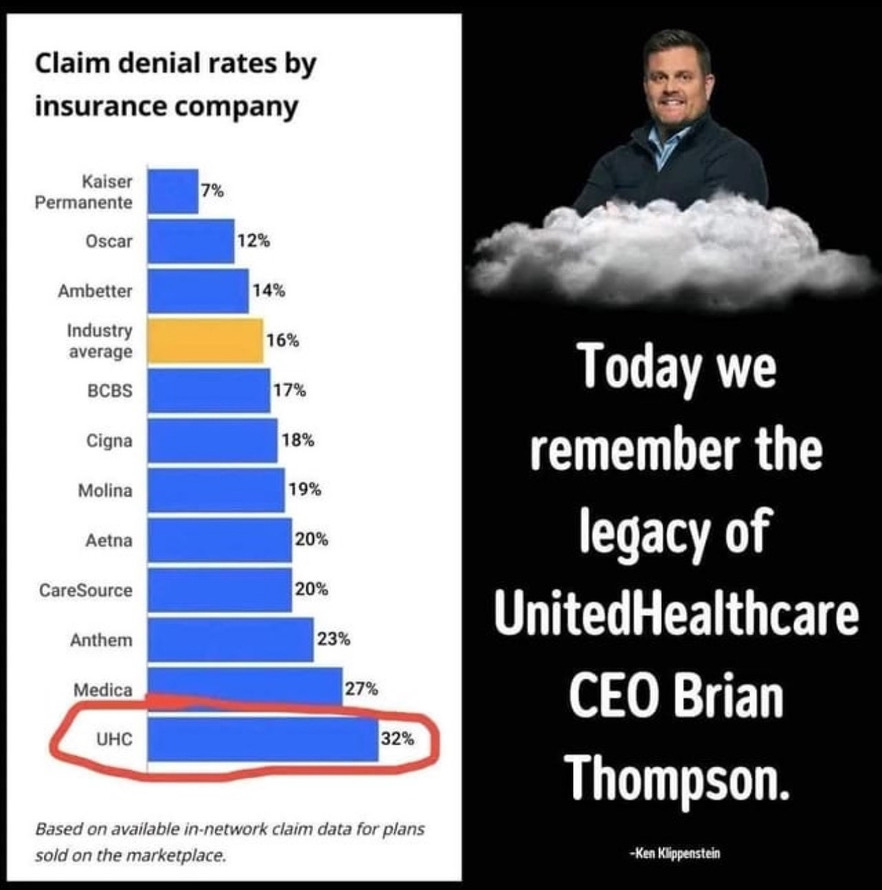My apologies in advance, as I feel I need to provide you with some meaty and at times dry background information about the politics of medicine to get to my point. I know you can do it!
Rural Mendocino County
When I first set up my rural Oncology practice in 2006, I traveled across the northern end of the state frequently to Sacramento to “lobby” (I was paid nothing) the California state Senate and Assembly for rural medicine. We had hoped to convince a majority to support bills to repeal or at least modify the state’s prohibition against the Corporate Practice of Medicine (“CPM” or “CPOM”). At the time, few states had strict CPM laws. About two thirds of states have some provisions against CPM.
My apologies for the acronyms strewn about this essay, but I have faith in you. It could be worse. Only the military can compare with medical acronyms, and from my time in military medicine, I could write a complete essay composed nearly entirely of acronyms. And yes I take dares.
CPM originated in the 1920’s, ostensibly to prevent the practice of medicine without a license in any form. OK, that’s good, right? Depends.
Define “narrow exceptions”?
Enter California Medical Association (CMA), a private organization representing fewer than 40% of California physicians but nevertheless having an extremely powerful, well-paid lobbying force. CMA remains staunchly supportive of the Corporate Practice of Medicine (CPM) to keep a stranglehold on physicians’ power in the state, though mid-level providers (“mid-levels,” such as “PAs” - Physician Assistants and “NPs” - Nurse Practitioners) are necessarily filling horrifying gaps in access to care.
For context:
California is the most populated state, at just under 40,000,000.
California represents 11.58% of the American population
California only gets 10% of the Electoral College votes
There are just over 125,000 physicians in California, the most of any state
There are roughly 3 physicians per 1000 residents
There is one primary care physician per 1,483 residents.
Approximately 11% of all primary care providers in the US work in California
Only 9% of California physicians practice in rural communities
Yet 20% of the state's 40,000,000 population (8,000,000) live in rural areas
Well sure, that works out.
Much later in life, it occurred to me that all doctors train at academic centers – in cities. There is little to no interest or training for working in rural medicine, where you are not hip deep in specialists. I grew up in rural America, but I can function quite well in cities if I must, and have. I chose to work as a specialist in rural, underserved areas, and without the necessity of indentured servitude to anyone. It wasn’t easy. I would dare any academic oncologist to do what I did and not drown.
Now a bit more about mid-levels in California. Though N.P.s (~41,000) and P.A.s (~12,000) are trained, and also licensed by the state, the California Medical Association (CMA) clearly considers them a threat to erode that power. Well, mid-levels now represent almost 30% of California healthcare providers, and most mid-levels work in primary care.
Summary: 5 out of 3 people are bad at math
Back to our scheduled program, CPM in California prohibits a non-physician from supervising any physician, which is why the venerable Mayo Clinic with some very qualified non-physicians in their governing board is illegal in California (Hello nearby Phoenix, AZ! and you just thought they liked you…).
Side note: Current CPM language does not refer to “non-physician” supervisors, but to “lay persons” in a position to supervise physicians. “Non-physician” is my interpretation of what I think the original laws intended, while “lay” in medicine typically refers to a non-professional or amateur. Many non-physicians are hardly amateurs to medicine or non-professionals. Many healthcare attorneys, psychologists, healthcare administrators, nurses, pharmacists, mid-levels and so forth know quite a lot about medicine. Effective supervisors are also not micromanagers.
What The Medical Board of California, the California Medical Association and the state got horribly wrong all along was what the “Corporate” in the Corporate Practice of Medicine meant.1 It did not mean individual small hospitals. Or academics. Or the VA. Or state prisons. Or the military. Or Indian Health.
Maybe they could focus on these healthcare corporations who have seized power over healthcare providers?
UnitedHealth Group’s Optum is currently the nation’s largest physician employer.2 (You may have heard of UnitedHealth in the news recently. More on that later.)
“Major players in the retail health space are CVS Health, Amazon, Walgreens, Walmart, Dollar General, and Best Buy, several of which retailers have reportedly committed $50 billion into primary care, equivalent to $50,000 per patient.”3
CPM also makes it near impossible to hire physicians in rural areas (see stats above), as without the option of being hired they must work as independent contractors, without personal healthcare or benefits of any kind for themselves or their family. Try recruiting with those barriers.
But wait! There’s more!
Consider that the American physician community is far more integrated than America itself, and rural California is predominately white. Through no fault of my own, I was the only white male in my fellowship program year at USC, in the mid 90s.
“The barriers to recruiting rural physicians are enormous, so let’s make it more difficult!” CMA, probably.
That said, California hypocritically makes numerous exceptions to CPM, such as for hiring physicians by the Prison System, Indian Health, Academic Institutions (Universities of California, Stanford, USC, etc.), Military Medicine and the VA, all of whom have non-physicians in positions of supervision on some level. Let’s be honest here, this is partly because the military and the VA would tell California to pound sand, and I consider myself a jarhead when I say jarheads mean it when they say pound sand. No, the playing field is not only slanted but also riddled with gopher holes.
Critical Access Hospitals (CAH) and Medically Underserved Areas/Populations (MUA/P) continue to struggle. You may find it both interesting and completely stupid that there are MUAs in the middle of Los Angeles. The less glamourous parts, of course.
Some Medically Underserved Areas/Populations (MUA/P) of Los Angeles County
You asked for more stats? No problem!4
As of October 28, 2020, there were approximately 3,438 designated MUA/Ps in the US. California had the largest number of MUA/Ps with 214. #winning
I had started my underserved, rural Hematology/Oncology clinic under a pilot project from the state legislature to see if allowing physicians to be hired by CAH was feasible (Ummm, 45 other states are already using that wheel?). The CAH where I worked was one of 11 facilities in all of California to qualify for that pilot project and successfully hire a physician for a critical service.
n = 11
Oh please, oh please don’t make me explain statistics to the CMA. Or as it turned out, that was part of the CMA lobbying plan all along. Here, take your poison pill.
Rural Mendocino County. Caution: That flat, straight road you’re on will end soon. No, there is no cell coverage, so no GPS either.
So, I drove the twisty 4 hours (~200 miles) to Sacramento numerous times and learned how they play their game. Any system can be used. I fortunately had my initial interest in polyscience piqued at Boys State in High School, then some experience in poly sci in undergrad, and later some direct observation of the legislative process, so I suppose the shock of government dysfunction was not as great for me as it has been when I tried to describe this latest experience to others.
I encourage everyone to become more familiar with their state government. Go to public hearings/meetings and watch the clowns perform in the circus. No, popcorn is generally not allowed, but you will be inspired to vote like never before. Learn how to get involved and how use the system to make our country work better.
Before you think politics is completely bleak, I promise you’ll also see some excellent legislators. Experts. Specialists. If you ever support term limits legislation, you should know that term limits only hurt the good legislators, and vis à vis, you and me.
Voting is the remedy for bad politicians, not term limits. That many who could won’t vote isn’t the ethical, productive politician’s fault, or an endorsement of the corrupt politician. That’s on the voters. Isn’t it cool when you discover the solution has been right in front of you the whole time, like Dorothy’s ruby slippers?
From the National Museum of American History
In my many 2-minute-maximum comments to the numerous Senate and Assembly committees involved in CPM legislation, it was both difficult and frustrating that many committee members were completely rude and inattentive – and clearly had no intention of letting anyone change their mind. Afterall, I was one of those testifying who did not offer favors or money, or threats for that matter.
But one time, that one single time, I did somehow manage to get and hold the attention of the Senate Health committee members and audience. To this day I recognize the rarity of that unrecorded event.
“Honorable committee members, I have traveled from rural Mendocino Count at my own expense because I want you to know as a physician in the Navy in San Diego, the Admiral never told me how to practice medicine. As a post-doctoral fellow at USC, the President never told me how to practice medicine. As one of your eleven CPM pilot physicians in the entire state, the CEO of our CAH never tells me how to practice medicine. On a daily basis however, I suspect each of you already realize that Medicare, Medi-Cal, Blue Cross/Blue Shield, Aetna, Cigna, United Health, Anthem and others constantly tell me how I am to practice medicine.”
It was the only standing ovation I ever received in those years or ever saw in my time there. That’s not bragging. That’s a picture I’m painting for you.
Sisyphus, totally rockin’ it
And then they voted to maintain the CPM status quo.
I have never felt so defeated, because I was under the impression that I could make a difference, so I went back again and again because it was the right thing to do. And it clearly made some of them uncomfortable, so I have no regrets. I know I reached some people, at least that one, single time. And if that made people start to think differently? I’ll never know, nor do I need to know, but I sleep well.
As of January 2024, of California’s 64 rural hospitals, the 37 that are designated Critical Access Hospitals now share in the carve-outs allowing for direct employment.5
No MUA/Ps, not you. Sit down. But who cares? I mean, those people don’t vote. They gave up on the system long ago.
That’s the bait, now for the switch.
I’m sure you’ve read and heard much about the murder of United Health Care CEO Brian Thompson on December 4, and perhaps like me, you’ve also read some of the medical community’s reactions. Mostly of indifference, but mostly at the system instead of a person few of us had ever heard of before.
But I was still looking for a different take on the reactions of this tragic event, though to be honest, initially I wasn’t quite sure why it didn’t set with me though I knew it wasn’t in what I was hearing/reading. And trust me I looked. And I looked. And that’s part of why it’s taken me so long to finally feel compelled to write this. It’s what I do.
Where are all those medical pundits again? Probably pushing their much-lauded books for personal gain.
No, I won’t dare “both sides” this like the derelict legacy media, and I’ll be clear it seems to me the opinions of most Americans are that this was clearly premeditated murder. After that the opinions diverge, to put it lightly.
With the Goldwater Rule6 firmly in mind, no, we do NOT know the mental state of this young man. Don’t expect that to keep the media from second-guessing, well, because they keep reminding us that they are not professionals and have no code of ethics.
BTW, I can cogitate about a Pixar movie for days to weeks, and I just saw Wicked after seeing the play on Broadway many years ago, owning the soundtrack, etc., so…
Has UHC “outperformed”7 the rest of the healthcare industry in denying care? That is a fact, not my opinion. If you feel the need to “believe” things, by all means go join a religion.
Did Brian Thompson give those denials by himself? No, I guarantee you those victims were completely faceless to him. It’s easier that way. Memento mori.
But no, Brian did not personally deny care to anyone anymore than Trump will bring fascism to America by himself. It takes an endless supply of complicit accessories to their crimes.
And the oft lamented “decivilization” brought about by the Luigis of our world?
I laughably think not.
When some people in this country have demonstrated they are above the law, and there is no longer any apparent hope for redress, there is what I call the suicide-homicide dilemma. Do you kill yourself, because it’s easier, or do you go to the source of your pain?
And there we are.
When the Rule of Law is so increasingly and publicly trounced, many of us may not surprisingly feel as if the only justice meted out will be from outside the empty Rule of Law of the land. Some people like the Luigis of the world will feel even more disenfranchised, and feel they have nothing left to lose.
Yes, this unforced error of the Supreme Court Six is starting to trickle down. If they thought this would have the same fake trickle-down effect as Reaganomics, they were so completely wrong. Yes, I especially blame Justice Roberts, Justice Thomas, and Justice Alito as the worst abusers, but Justice Gorsuch, Justice Kavanaugh, and Justice Barrett are really no better.
Whenever there is a problem, the most important thing is to establish blame.
The Supreme Court Six’ open disdain for our Rule of Law has brought an overwhelming sense of betrayal to the people, and not surprisingly, some will take it into their own bloody hands.
But I cannot leave it there. Many a patient confided to me over the years that friends had told them this or that platitude that their cancer would make them a better person, or that it would make them stronger, or even that everything happens for the best. No, I would say, not true, and watch them sigh with relief that someone else understood. Then I would quote James K. Feibleman:
“That some good can be derived from every event is a better proposition than that everything happens for the best, which it assuredly does not.”
And add that the good that can be derived is a choice we make.
Luigi’s element of surprise nicely addressed the hubris of the healthcare insurance industry. Caught completely off guard, they were unable to correct course quickly enough, resulting in many people finally having a close-up look and talking about a tiny fraction of Corporations’ heinous treatment of Americans just to line their own corporate pockets.
And that’s the good I choose to take from this. Knowledge is power.
Minato No Akebono, scented Camilia, my yard, northern California. Memento vivere.
Choose the good from the awful situations yet to come.
CVS Health acquired home health company Signify Health for $8 billion, gaining access to 10,000+ clinicians. In addition, they also invested $100 million in a partnership with primary care platform Carbon Health and acquired primary care platform Oak Street Health for $10 billion.
Walgreens’s VillageMD acquired Summit Health for around $9 billion, adding 2,000 primary care physicians.
Amazon acquired primary care company One Medical for around $4 billion, gaining access to 8,000 clinicians.
















Yes, Johnny, "an endless supply of complicit accessories."
As one who for more than 50 years has been reading Wendell Berry (and many other great advocates of regionalism), I say big yes to your own commitment to rural, underserved areas.
As one, additionally, who long ago spent youthful years hitching all over America -- and I mean just about everywhere -- I celebrate the beauty and vitality of our non-urban regions.
I celebrate them all the more as alternative to the conformities foisted by the corporate world on so many in city life. These conformities get foisted, worse, by corporate academe on K-12, dehumanized by standardized testing as well as by the corporate textbook packagers chronicled in Diane Ravitch's ""The Language Police" (2003). Dehumanization comes, too, by corporate academe on "higher" ed, now neutered both by specialist silos and group identity conceits.
Overwhelming, that "endless supply of complicit accessories."
This is a really good article even though at times it was difficult to read. Not John Rochat’s fault, simply the fault of all the acronyms and the morass that is our healthcare system! I’m a great believer in Medicare for all, just to let you know. On a personal level I will never forget when I was diagnosed with cancer a few years ago John Rochat a friend of mine, said “ promise me one thing.” I said “ ok, what?”Promise me that this will not make you a better person“. I’ve told many people that and we all just fall apart laughing